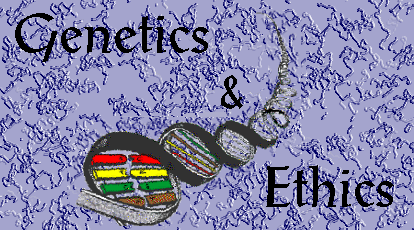

| It has been noted that along with the important information uncovered by the Human Genome Project, a great controversy will arise. It has been noted that even though blood tests are now available for various fatal diseases such as Huntington’s Disease, Cystic Fibrosis, and Colon Cancer, the American population would rather live with uncertainty than know they have an incurable life-threatening disease. This is mainly because the tests, which have been developed, are to detect the disease and not cure it. Furthermore, many believe in the future, employers in addition to drug tests may require blood tests for fatal diseases. This will increase the tendency for a healthy applicant to be accepted for a job over an individual who carries a gene for Colon Cancer. To deal with all of these issues, the Department of Energy and National Institutes of Health donate 5% of their budget for research towards study of the ethical and social issues related to the Human Genome Project. |
| Ethical, legal, and social issues are handled by ELSI, the world’s biggest bioethics program. Some of the issues they are most concerned with are as follow. They are interested in learning about the fairness in the use of genetic information, and how the privacy and confidentiality of the information will be controlled. Another topic of interest is if testing for untreatable diseases should be allowed, if parents should be able to have their minor children tested, and if the tests are reliable enough. Other aspects include reproduction factors. Should parents be allowed to test their unborn for diseases in order to make proper decisions on whether to continue the pregnancy. ELSI’s ultimate goal is to fully understand all of the ethnic, cultural, social, and psychological issues that are in standing and be able to spread greater acceptance of for the Human Genome Project. |